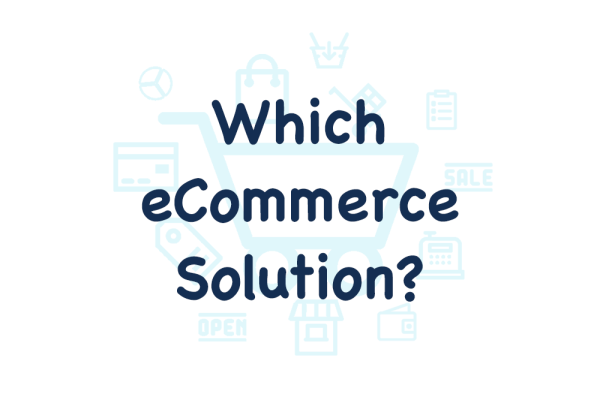Which eCommerce Platform is best? 2025 Why it's not Shopify!
WooCommerce, PrestaShop or Magento? Which platform should I use in 2025?
If you search for the best eCommerce Platform you will find a lot of online results, in this situation you may get confused, especially when you are experiencing digital selling with an online shop for the first time.
How to decide..
Examining all of the current solutions to building a shop may not work, as it's a time-consuming, confusing and exhausting job. So, to simplify the process and to give a general solution I have always had a key factor in my mind: the solution must be reliable. However, depending on the situation, various decisions could be made.
There are a lot of reasons to say that I believe in open-source (for example, removing vendor lock-in, power of community based projects, etc..), so we are looking for an open eCommerce solution.
Let' take a look at the numbers
Let's take a look at the statistics for the popularity of different eCommerce platforms:
Builtwith: Link
W3techs: Link
Storeleads: Link
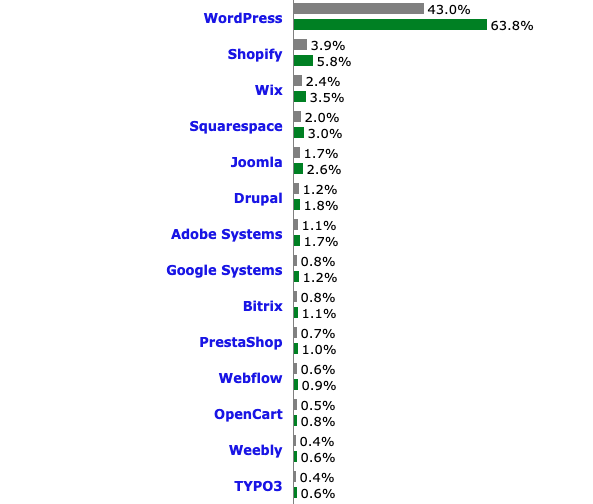
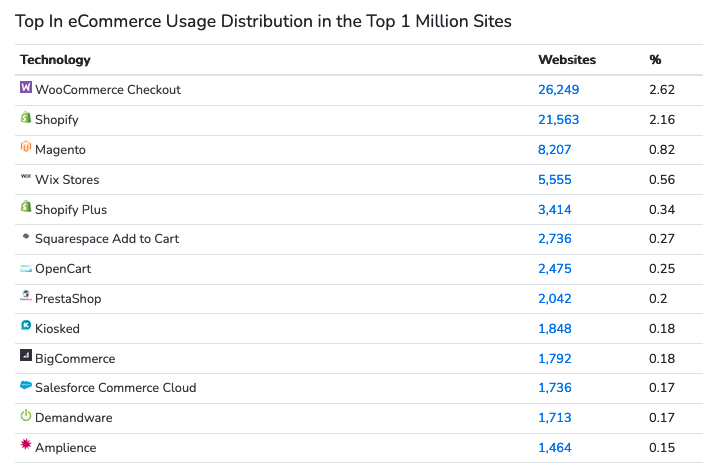
As you see there are a lot of well-known and popular open solutions, top three of them: WooCommerce, Magento and PrestaShop. Popularity is not the only metric to choose a technology, but all of the mentioned solutions have some characteristics in common: they have been reliable for many years and they have a powerful community.
WooCommerce
is a Wordpress plugin, WP is popular enough and is plugin-rich but is not originally designed for online selling, so if the brand grows fast, we may need performance tweaks (and probably re-platforming), however It works perfectly for CMS/blogging.
Magento (Adobe Commerce)
is too much enterprise, hard to maintain and hard to operate. A look at its EAV data structure shows that it aims to fit ERP systems and it wants to meet a scalable system's requirements, and the result is a huge bloated software. Even if you want to migrate your Magento website to another platform or a custom solution in the future, it would be a complicated scenario because of this type of database structure. Moreover, it's not a good solution for small to medium size shops, and it's not even possible to install it on a medium shared host.
Additionally, a big monolithic software probably wouldn't be the answer for a scalable system.
PrestaShop
Technically, PrestaShop is a moderate solution, internal technology is not perfect for developers, however it's good enough as a starting point, and the default installation is highly SEO-friendly without needing for any extension or plugin.
Additionally, it's extension-rich. More than 4,000 PrestaShop modules exist to help you to customize your online store, increase traffic, improve conversion rates and build customer loyalty.
One of the biggest PrestaShop advantages, is the clean database structure. It has implemented the multi-language functionality in a nice way, and the overall database structure is not complex. This makes it easy to make reports and analyzing business factors and doing business intelligence tasks.
Private SaaS Solutions and Why Shopify-like platforms are not a good option!
What about the private SaaS solutions like Shopify? As I mentioned we will investigate open-source platforms, but what is the main reason? in short: to take control of your business.
SaaS eCommerce solutions may have a good time to market, but if you are thinking about scaling your business, and if you are spending a lot of time for it, you should be more careful.
No matter Shopify or Commercetools, it's same for any private SaaS solution. When I say private SaaS, I mean any eCommerce solution that you do not have the source code, and you are not free to change building blocks and manage your infrastructure.
Here are some real-world examples:

One more example:
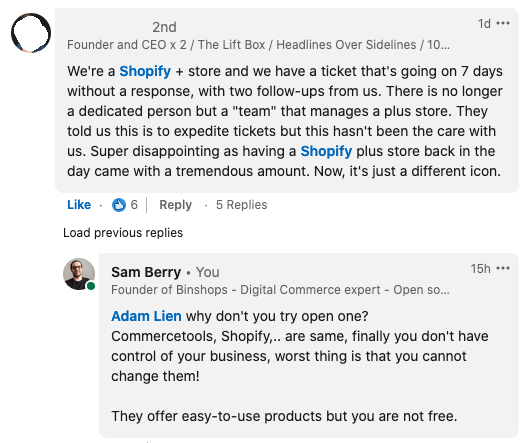
Subscriptions are not always fixed, they fluctuate whenever they want. It's okay, any service provider may change pricing, but the problem is that you can never switch to another provider.
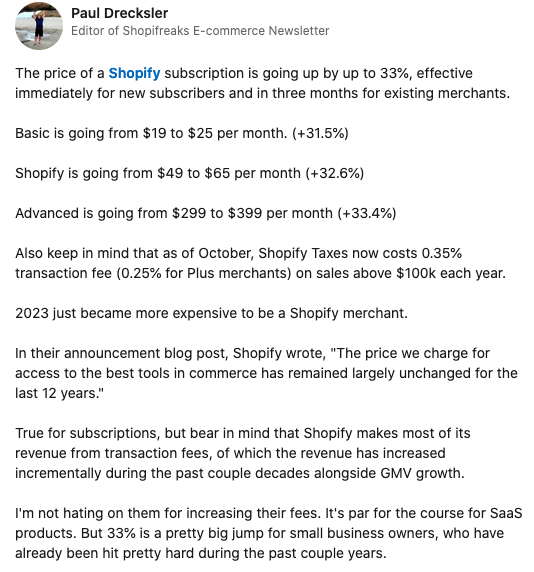
And there are a lot of same stories..
When should we use Shopify?
If you are new in online selling and eCommerce, Shopify or other SaaS solutions could be a very good playground. Using Shopify you can easily bring up a shop to test and getting familiar with the main building blocks of an eCommerce platform. However, if you are looking for a long-term solution for your business that shapes one of your main revenue streams, an open-source solution would be a great choice.
What about other Open source platforms?
There are many other open-source eCommerce platforms like Bagisto (laravel based eCommerce), Saleor, Shopware, Sylius, Aimeos, Vendure,.. each of them have different options, and various visions. Some of them have focused on developer experience, some of them have focused on building a scalable solution, etc.. and you probably know there are long comparison of their features all around the web.
However, they are not community-rich, at least compared to Woo, PrestaShop and Magento. Also, most of them are new platforms that need time to be more robust and more stable to be considered as a reliable platform.
All of the three mentioned eCommerce platforms (WooCommerce, PrestaShop, Magento) are popular enough for years and they are community-rich. You can find developers and agencies all around the world, there are many online materials, so if you use them, you are not left on your own.
KISS
Woo and PrestaShop follow "Keep It Simple Stupid" principle, so my 2025 answer to anyone who asks which technology you recommend will probably be Woo or PrestaShop, based on the situation.
Our role at Binshops
I will write more about this topic, but for now just wanted to note why we believe in PrestaShop, actually to start selling online and to grow, merchants don't need cutting-edge software or a super computer, it's a journey, and don't panic with technical debt, changing things is always a part of growth.
We are trying to show that digital brands' growth is not limited if they choose the PrestaShop technology stack. For example, we have released our client's mobile app which I believe its a unique ecommerce mobile application in terms of performance. Let's check the performance. Take attention it's not a small shop, it has 120K digital products.
I will keep this article up-to-date with the latest opinions.
Feedback
Here I aggregate feedback about this topic:
PrestaShop is not a leader anymore, and it's ok. Woocommerce is eating the Open Source ecosystem and Shopify and Adobe are eating the Closed Source ecosystem with cloud solutions.
In France, PrestaShop will stay well established because they have great experts and amazing web agencies! But the day they move to WooCommerce or Shopify I don't see any chance for the project to grow
Article Updates
Dec 14, 2022 - Initial version
Jan 21, 2023 - Storeleads report added
Jan 25, 2023 - Shopify increased subscription in 2023
Jan 29, 2023 - Other open source platforms
June 7, 2023 - When should we use Shopify?
Sep 10 2023 - PrestaShop neat database structure
Posted 2 years ago by

